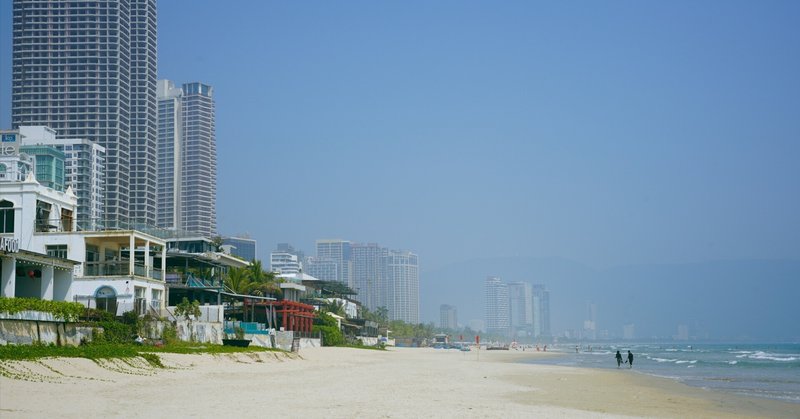
移動とは「あたりまえ」を広げること Expanding what is "normal" for us
今週はベトナムのダナンにいます。
This week I am in Da Nang, Vietnam.
成田空港からベトジェットを使って、ホーチミン、ダナンと移動をしてきました。移動とは一体何なのでしょうか。
Using VietJet from Narita Airport, I have traveled through Ho Chi Minh and Da Nang. What exactly does this travel mean?
人類の歴史を振り返ると、その大半を狩猟採集生活を基本として過ごしてきました。私たちが当たり前に思う定住や農耕牧畜とシステムは俯瞰してみると、つい最近のことです。
Looking back at the history of humanity, for the most part, we have lived based on a hunter-gatherer lifestyle. The settled life and agricultural and pastoral systems that we take for granted today are, when viewed in perspective, quite recent developments.


霊長類学者の山極さんは著書「共感革命」で人類の歴史の中で、「狩猟採集時代の頃の人類は、150人ぐらいの集団で共感力を使って仲良く生きていた」「集団間の争いは生まれにくかった」と述べています。ウクライナやイスラエルをはじめとして、世界のあちこちで戦争・紛争が起こる中、過去を紐解くと、本来の人間の姿は「競争的」ではなく、「共感力」を持って平和に暮らしていたと主張しています。
Primatologist Dr. Yamagiwa mentions in his book "The Empathy Revolution" that during the hunter-gatherer era, humans lived in groups of about 150 people using empathy to get along well and that conflicts between groups were rare. Amid wars and conflicts happening around the world, including in Ukraine and Israel, he argues that the original nature of humans was not "competitive" but "empathetic" and lived peacefully.
狩猟採集生活では、富や権力という考えがありません。捕らえた獲物は老若男女平等に分ける。所有という概念もなく、狩猟に使う道具も貸し借りが前提で社会が成り立っていたということです。ところが、定住し、農耕を始めることで、集団生活や計画的行動、蓄えという概念が生まれ、そこには権力者が誕生し、富めるものとそうでない者の格差が広がっていきます。
In hunter-gatherer societies, there was no concept of wealth or power. Captured prey was equally divided among all, regardless of age or gender. There was no concept of ownership, and tools used for hunting were shared, forming the basis of society. However, with the onset of settlement and agriculture, concepts like community life, planned action, and accumulation emerged, leading to the birth of rulers and the widening gap between the wealthy and the poor.


こうやって今、資本主義社会の中で格差が広がったり、人種差別を含む人権問題の原因の根幹にあるのは、人類の大多数が土地を持ち、定住を選択することで、結果的に移動をしていないことのようにも思えてきます。
Now, within our capitalist society, the expansion of inequality and the roots of human rights issues, including racial discrimination, seem to stem from the majority of humanity owning land and choosing to settle, consequently not moving
物理的に移動する、例えば、他の国に行く、あるいは他の都道府県に行くと誰しも、普段考えていないことを考えるようになることがあります。それは、目に映る景色が変わるだけではなく、接する人や食べ物も変わることで、部外者としてその環境に適応するために、人としてやさしくなるからかもしれません。何もかもが新しい環境では、誰もが新人選手として振る舞う必要があるのです。
Physically moving, like traveling to another country or prefecture, can make us think about things we usually don't consider. This could be because not only the scenery changes, but also the people we interact with and the food we eat change, requiring us to adapt as outsiders, possibly making us kinder as individuals. In a completely new environment, everyone needs to act as a newcomer.
移動といっても、物理的な移動に限りません。例えば、同じ会社でずっと働いていたら、いわゆる「権力」というやつを見にまとい、無意識のうちに横柄な態度をとるかもしれません。けれどもどうでしょう。全く新しい職場の新人になった時には、誰しもが謙虚な姿勢を忘れず、相手を思いやる、ていねいな態度をとるのではないでしょうか。それはまさしく、山極さんの主張する「共感力」につながるように思います。
Movement is not limited to physical relocation. For example, if you work at the same company for a long time, you might unconsciously adopt an arrogant attitude due to so-called "power." However, when you become a newcomer in a completely new workplace, everyone tends to remember to be humble, considerate, and polite, which seems to connect to Dr. Yamagiwa's concept of "empathy."



こう考えると、私たちにとって、移動とは、自分にとっての「あたりまえ」を広げることなのかもしれません。
Thus, for us, movement might be about expanding our own "normals."
狩猟採集時代でいえば、それまでのあたりまえの環境から離れて新たな環境で獲物を狙うこと。それは諸行無常の世界であり、同じものは二度とやってきません。
In the hunter-gatherer era, this meant leaving the familiar environment to hunt in a new one, which is a world of impermanence where nothing is the same twice.
今の時代でいえば、住む場所や働く場所を変えて、その周りにあるあたりまえをリセットすることかもしれません。今、僕はベトナムにいますが、横断歩道を渡るのも一苦労です。行き交うバイクや車を避けながら、前に進まなければなりません。あるいは、仕事を辞めて、新しい生活基盤を1から整える、未来について考えることも、あたりまえを広げる作業の一つでしょう。
In today's age, it could mean changing where we live or work, resetting the "normals" around us. Now I am in Vietnam, and even crossing the street is a challenge. I have to move forward while avoiding the oncoming bikes and cars. Or, quitting a job and starting to build a new life foundation from scratch, thinking about the future, might also be a way to expand what's normal for us.
ハイパーメディアクリエイターの高城さんは「移動距離とクリエイティビティは比例する」と仰っていますが、その通りに思います。「あたりまえ」を少しずらしてみることで、新たに見える世界があるのです。思えば、日本人の祖先も遥か遠くのアフリカ大陸からせっせと移動してきたのですから。
Hypermedia creator Mr. Takashiro says, "The distance of movement is proportional to creativity," and I think he is right. By shifting our "normal" even slightly, a new world becomes visible. After all, our Japanese ancestors also moved diligently from the distant African continent.


この記事が気に入ったらサポートをしてみませんか?
